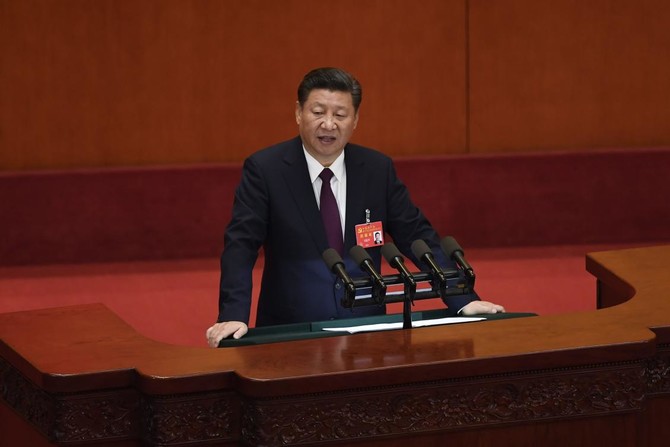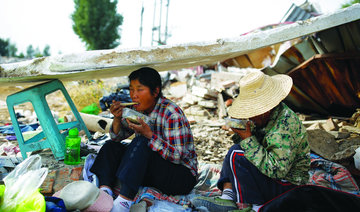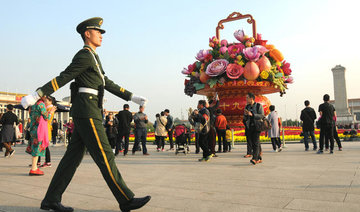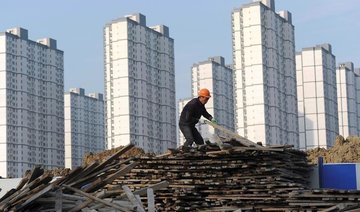BEIJING: President Xi Jinping declared China is entering a “new era” of challenges and opportunities on Wednesday as he opened a Communist Party congress expected to enhance his already formidable power.
Xi told some 2,300 delegates at the imposing Great Hall of the People that the party must “resolutely oppose” any actions that undermine its leadership as it steers a course through a high-stakes period in its development.
“The situation both domestic and abroad is undergoing profound and complex changes,” said Xi, who is expected to secure a second five-year term as general secretary and stack leadership positions with loyalists during the twice-a-decade congress.
“China’s development is still in a stage of important strategic opportunities. The prospects are bright, but the challenges are also severe,” he said in a marathon speech that exceeded three hours and was met by waves of applause.
“Socialism with Chinese characteristics has entered a new era.”
Speaking in front of a massive hammer and sickle, Xi touted his nationalistic “China dream” slogan, vowed to open the economy, promised to win the fight against poverty, and warned he would continue a “zero tolerance” campaign against corruption.
“Every one of us in the party must do more to uphold party leadership and the Chinese socialist system and resolutely oppose all statements and actions that undermine, distort or negate them,” he said.
Considered China’s most powerful leader since Deng Xiaoping or even Mao Zedong, Xi could use the congress to lay the foundation to stay atop the 89-million-strong party even longer than the normal 10 years, according to analysts.
That would break the unwritten two-term limit accepted by his immediate predecessors Jiang Zemin and Hu Jintao — who were by Xi’s side at the congress — and end the era of “collective leadership” aimed at preventing the emergence of another Mao.
Another signal of Xi’s rise to the pantheon of Chinese leadership would be if his name is added to the party constitution, an honor that has only been bestowed upon modern China’s founder, Mao, and the father of economic reforms, Deng.
Potential rivals have been swept aside under Xi’s vast anti-corruption drive, which punished 1.3 million Communist Party officials over five years.
Xi said the campaign has been “unswervingly fighting against ‘tigers’, ‘beating flies’, ‘hunting foxes’” — terms used for lower- and higher-ranking officials, as well as those who have fled abroad.
His rise has also been marked by a relentless crackdown on dissent, with authorities even refusing to free Nobel peace prize laureate Liu Xiaobo as he lay dying of cancer in July.
On other fronts, Xi touted efforts to complete the army’s modernization by 2035 and build artificial islands in the disputed South China Sea
In a stern warning to self-ruled Taiwan, which Beijing considers a rebel province, Xi said China has the “ability to defeat separatist attempts for Taiwan independence in any form.”
Xi, who has championed globalization in the face of President Donald Trump’s “America First” policies, vowed to further open up China’s economy.
Foreign companies complain that Xi’s words have not been backed by deeds, as the state retains control over the economy.
US and European firms report being barred from certain sectors and forced to share their technologies with local competitors.
Trump, who will visit Beijing next month, has launched a trade investigation into China’s intellectual property practices.
“China will not close its doors to the world, we will only become more and more open,” Xi said, pledging to “protect the legitimate rights and interests of foreign investors.”
Authorities stepped up policing for the week-long congress, with red armband-wearing “security volunteers” fanning out across the capital, karaoke bars closing and online kitchenware firms even suspending knife sales.
The conclave, which will mostly meet behind closed doors and end next Tuesday, will select new top party members, including for the Politburo Standing Committee, China’s all-powerful ruling body.
Xi and Premier Li Keqiang are expected to remain on the committee while the five other current members are supposed to step down under an informal retirement age set at 68.
Xi may lobby to retain his 69-year-old right-hand man Wang Qishan, who heads the leader’s signature anti-graft campaign. This would create a precedent for Xi himself to remain in charge beyond retirement age in 2022.
But a Xi heir apparent could emerge from the congress.
One former potential successor who was outside Xi’s circle, Sun Zhengcai, was ousted from the party last month due to graft allegations.
Chen Miner, a former Xi aide who succeeded Sun as political chief in the city of Chongqing, is now well positioned for promotion.
Xi declares ‘new era’ for China as party congress opens
Xi declares ‘new era’ for China as party congress opens

Iran summons British envoy after arrest of nationals

TEHRAN: Iran has summoned a British envoy in Tehran to protest the arrest of several of its nationals on charges of spying, state media reported Monday.
“Following the unjustified arrest of a number of Iranian nationals in the UK... the British charge d’affaires in Tehran was summoned on Sunday,” the IRNA news agency said, describing the arrests as “politically motivated.”
Three Iranian men appeared in a London court on Saturday charged with spying for the Islamic republic.
They were arrested on May 3 and identified as Mostafa Sepahvand, 39, Farhad Javadi Manesh, 44, and Shapoor Qalehali Khani Noori, 55, all living in London.
The British Home Office said they were irregular migrants who arrived by small boat or other means, such as hidden in a vehicle, between 2016 and 2022.
The alleged spying took place from August 2024 to February 2025, according to UK police.
A fourth man was arrested on May 9 as part of the investigation, but has now been released without charge, the police said in a statement.
Five Iranians were also arrested on May 3 in a separate investigation.
Four of the men — who had been held on suspicion of preparation of a terrorist act — had been released, although the investigation “remains active and is ongoing,” police said.
The fifth was earlier bailed to an unspecified date in May.
Indonesia searches for 19 people after landslide at gold mine in Papua

JAKARTA: Indonesian rescue teams were searching for 19 people missing after heavy rain caused a landslide at a gold mine in its easternmost region of Papua, officials said on Monday.
Torrential rain triggered a landslide late on Friday in a small-scale mine run by local residents in the Arfak mountains in West Papua province, said Abdul Muhari, the spokesperson of Indonesia's disaster mitigation agency.
The landslide hit temporary shelters used by the miners and killed at least one person and injured four with 19 others still missing, he added.
At least 40 rescuers with police and military personnel had been deployed to search for the missing, officials said.
Small-scale and illegal mining has often led to accidents in Indonesia, where mineral resources are located in remote areas in conditions difficult for authorities to regulate.
The rescuers started the search operation only on Sunday because it took at least 12 hours for teams to travel to the site, Yefri Sabaruddin, the head of the local rescue team, told Reuters on Monday.
"The damaged roads and mountainous tracks as well as bad weather hampered the rescue efforts," Yefri said.
The number of casualties could rise, he added.
At least 15 people died in the collapse of an illegal gold mine in West Sumatra province September last year after a landslide caused by heavy rains.
Another landslide in a gold mine on Sulawesi island killed at least 23 people in July last year.
Trump to hold call with Putin in push for Ukraine ceasefire

- Says he would also speak to Ukraine's President Zelensky and NATO officials
- Trump has repeatedly stressed that he wants to see an end to the Ukraine-Russia conflict
WASHINGTON: US President Donald Trump will hold a phone call with Russia’s Vladimir Putin on Monday as part of his long-running effort to end the war set off by Moscow’s 2022 invasion of Ukraine.
Trump had vowed during the US election campaign to halt the conflict within a day of taking office, but his diplomatic efforts have so far yielded little progress.
Delegations from Russia and Ukraine held direct negotiations in Istanbul last week for the first time in almost three years, but the talks ended without a commitment to a ceasefire.
Both sides traded insults, with Ukraine accusing Moscow of sending a “dummy” delegation of low-ranking officials.
After the negotiations, Trump announced that he would speak by phone with the Russian president in a bid to end the “bloodbath” in Ukraine, which has destroyed large swathes of the country and displaced millions of people.
Trump also said he would speak to Ukrainian President Volodymyr Zelensky and NATO officials, expressing hope that a “ceasefire will take place, and this very violent war... will end.”
Since taking office in January, Trump has repeatedly stressed that he wants to see an end to the conflict, and has recently backed calls for an unconditional 30-day ceasefire.
So far, he has mainly focused on upping the pressure on Ukraine and abstained from criticizing Putin.
Both Moscow and Washington have previously stressed the need for a meeting on the conflict between Putin and Trump.
The US president has also argued that “nothing’s going to happen” on the conflict until he meets Putin face-to-face.
At the talks in Istanbul, which were also attended by US officials, Russia and Ukraine agreed to exchange 1,000 prisoners each and trade ideas on a possible truce, but with no concrete commitment.
Ukraine’s top negotiator, Defense Minister Rustem Umerov, said that the “next step” would be a meeting between Putin and Zelensky.
Russia said it had taken note of the request.
“We consider it possible, but only as a result of the work and upon achieving certain results in the form of an agreement between the two sides,” the Kremlin’s spokesperson said.
Ukraine’s western allies have since accused Putin of deliberately ignoring calls for a ceasefire and pushed for fresh sanctions against Russia.
The leaders of Britain, France, Germany and Italy held a phone call with Trump on Sunday.
“Looking ahead to President Trump’s call with President Putin tomorrow, the leaders discussed the need for an unconditional ceasefire and for President Putin to take peace talks seriously,” said a spokesman for British Prime Minister Keir Starmer.
“They also discussed the use of sanctions if Russia failed to engage seriously in a ceasefire and peace talks,” the spokesman said.
Zelensky also discussed possible sanctions with US Vice President JD Vance when they met after Pope Leo’s inaugural mass at the Vatican on Sunday.
“We discussed the talks in Istanbul, where the Russians sent a low-level delegation with no decision-making powers,” Zelensky wrote on Telegram following the meeting.
“We also touched on the need for sanctions against Russia, bilateral trade, defense cooperation, the situation on the battlefield and the future exchange of prisoners.”
A senior Ukrainian official from the president’s office, who spoke on condition of anonymity, told AFP that they had also discussed preparations for Monday’s telephone conversation between Trump and Putin.
It was the first meeting between Zelensky and Vance since their heated White House exchange in February.
In the Oval Office, Vance publicly accused Zelensky of being “disrespectful” toward Trump, who told the Ukrainian leader he should be more grateful and that he had no “cards” to play in negotiations with Russia.
Ukraine on Sunday said that Russia had launched a record number of drones at the country overnight, targeting various regions, including the capital Kyiv, where a woman was killed.
Another man was killed in the southeastern Kherson region, where a railway station and private houses and cars were hit.
In an interview with Russian state TV published on Sunday, Putin said that Moscow’s aim was to “eliminate the causes that triggered this crisis, create the conditions for a lasting peace and guarantee Russia’s security,” without elaborating further.
Russia’s references to the “root causes” of the conflict typically refer to grievances with Kyiv and the West that Moscow has put forward as justification for launching the invasion in February 2022.
They include pledges to “de-Nazify” and demilitarise Ukraine, protect Russian speakers in the country’s east, push back against NATO expansion and stop Ukraine’s westward geopolitical drift.
However, Kyiv and the West say that Russia’s invasion is an imperial-style land grab.
Trump to carry out tariff threats if nations don’t negotiate in ‘good faith,’ US treasury chief warns

- Bessent: Notified countries likely to see April 2 rates return
- Says Trump administration was focused on its 18 most important trading relationships
WASHINGTON: President Donald Trump will impose tariffs at the rate he threatened last month on trading partners that do not negotiate in “good faith” on deals, Treasury Secretary Scott Bessent said in television interviews on Sunday.
He did not say what would constitute “good faith” negotiations or clarify the timing to announce any decisions to return a country to the various rates Trump initially imposed on April 2.
Trump has repeatedly reversed course since then, notably on April 9, when he lowered his tariff rates on most imported goods to 10 percent for 90 days to give negotiators time to hash out deals with other countries. He separately lowered the rate for Chinese goods to 30 percent. On Friday, he reiterated that his administration would send letters telling nations what their rates would be.
On Sunday, Bessent said the administration was focused on its 18 most important trading relationships and that the timing of any deals would also depend on whether countries were negotiating in good faith, with letters going out to those that did not.
“This means that they’re not negotiating in good faith. They are going to get a letter saying, ‘Here is the rate.’ So I would expect that everyone would come and negotiate in good faith,” he told NBC News’ “Meet the Press.”
He added that those countries that are notified would likely see their rates return to the levels set on April 2.
Asked when any trade deals could be announced, Bessent separately told CNN’s “State of the Union” program: “Again, it will depend on whether they’re negotiating in good faith.”
“My other sense is that we will do a lot of regional deals -this is the rate for Central America. This is the rate for this part of Africa,” he added.
Trump’s ongoing trade wars have severely disrupted global trade flows and roiled financial markets as investors grapple with what Bessent has called the Republican president’s “strategic uncertainty,” in his drive to reshape economic relationships in the US’ favor
Companies of all sizes have been whipsawed by Trump’s swift imposition of tariffs and sudden reversals as they seek to manage supply chains, production, staffing and prices. Congress is also grappling with the tariffs as it weighs revenues and tax cuts in its spending bill.
Walmart, the world’s largest retailer, last week said it would have to start raising prices later in May due to the high costs of tariffs, prompting Trump to slam the company for blaming the increases on his trade policies.
“Between Walmart and China they should, as is said, ‘EAT THE TARIFFS,’ and not charge valued customers ANYTHING,” Trump posted online on Saturday.
Bessent said he had spoken to Walmart CEO Doug McMillon on Saturday and that the company would absorb some tariffs. Representatives for the retailer declined to comment.
“Walmart is, in fact, going to ... eat some of the tariffs,” Bessent told NBC. “I didn’t apply any pressure.”
Britain poised to reset trade and defense ties with EU

- Starmer taking a political risk with closer EU ties
- Deal likely to cover defense, trade, fish
LONDON Britain is poised to agree the most significant reset of ties with the European Union since Brexit on Monday, seeking closer collaboration on trade and defense to help grow the economy and boost security on the continent.
Prime Minister Keir Starmer, who backed remaining in the EU, has made a bet that securing tangible benefits for Britons will outweigh any talk of “Brexit betrayal” from critics like Reform UK leader Nigel Farage when he agrees closer EU alignment at a summit in London.
Starmer will argue that the world has changed since Britain left the bloc in 2020, and at the heart of the new reset will be a defense and security pact that could pave the way for British defense companies to take part in a 150 billion euros ($167 billion) program to rearm Europe.
The reset follows US President Donald Trump’s upending of the post-war global order and Russia’s full-scale invasion of Ukraine, which have forced governments around the world to rethink ties on trade, defense and security. Britain struck a full trade deal with India earlier this month and secured some tariff relief from the United States. The EU has also accelerated efforts to forge trade deals with the likes of India and deepen partnerships with countries including Canada, Australia, Japan and Singapore.
Negotiations between the two sides continued into Sunday evening, before European Commission President Ursula von der Leyen and European Council President Antonio Costa were due in London on Monday morning. One EU diplomat cautioned that “nothing is agreed until everything is agreed.” From the issues up for discussion, Britain is hoping to drastically reduce the border checks and paperwork slowing down UK and EU food and agricultural exports, while access to faster e-gates for UK travelers at EU airports would be hugely popular.
In return, Britain is expected to agree to a limited youth mobility scheme and could participate in the Erasmus+ student exchange program. France also wants a long-term deal on fishing rights, one of the most emotive issues during Brexit.
Limited room for maneuver
Britain’s vote to leave the EU in a historic referendum in 2016 revealed a country that was badly divided over everything from migration and sovereignty of power to culture and trade.
It helped trigger one of the most tumultuous periods in British political history, with five prime ministers holding office before Starmer arrived last July, and poisoned relations with Brussels.
Polls show a majority of Britons now regret the vote although they do not want to rejoin. Farage, who campaigned for Brexit for decades, leads opinion polls in Britain, giving Starmer limited room for maneuver.
But the prime minister and French President Emmanuel Macron have struck up a solid relationship over their support for Ukraine, and Starmer was not tainted with the Brexit rows that went before, helping to improve sentiment.
‘Break the taboo’
The economic benefit will be limited by Starmer’s promise to not rejoin the EU’s single market or customs union, but he has instead sought to negotiate better market access in some areas — a difficult task when the EU opposes so-called “cherry picking” of EU benefits without the obligations of membership.
Removing red tape on food trade will require Britain to accept EU oversight on standards, but Starmer is likely to argue that it is worth it to help lower the cost of food, and grow the sluggish economy.
Agreeing a longer-term fishing rights deal will also be opposed by Farage, while the opposition Conservative Party labelled Monday’s event as the “surrender summit.”
One trade expert who has advised politicians in both London and Brussels said the government needed to “break the taboo” on accepting EU rules, and doing so to help farmers and small businesses was smart.
Trade experts also said Britain benefited from the greater focus on defense, making the deal look more reciprocal, and said improved ties made sense in a more volatile world.
When “trade disruption is so visible and considerable” anything that reduced trade friction with a country’s biggest trading partner made sense, said Allie Renison, a former UK government trade official at consultancy SEC Newgate.




















